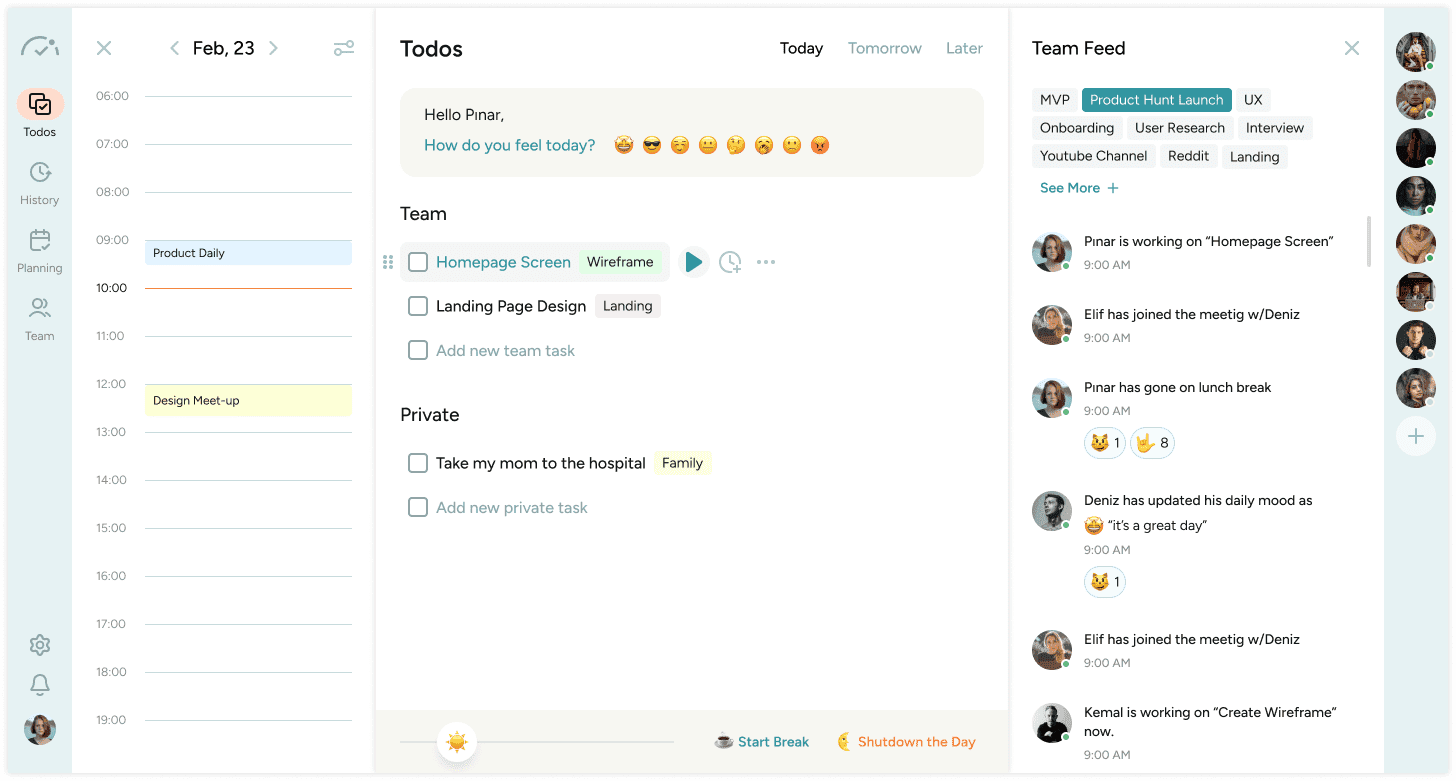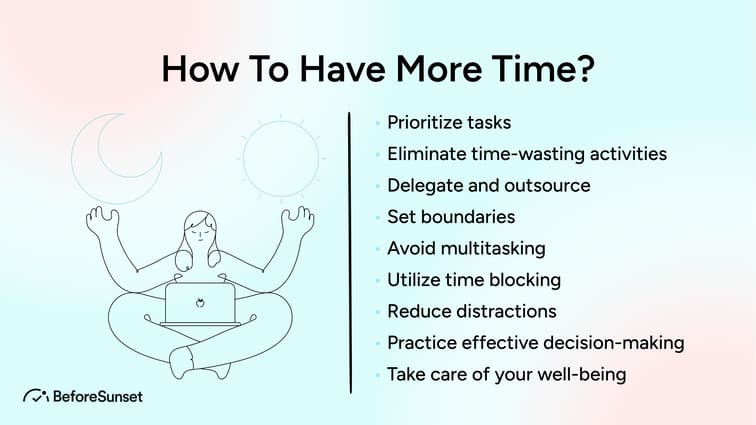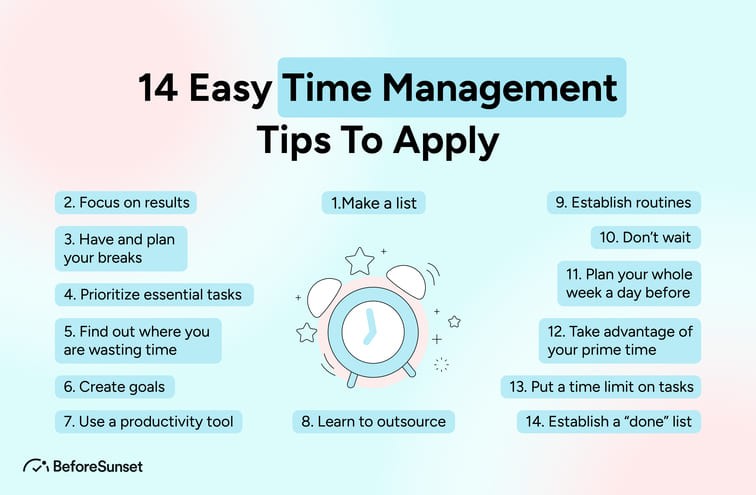Do you feel like you don’t have enough time, or do you need to spend your day in a frenzy to complete your tasks?
Time is probably the most valuable asset that we all have. Our main struggle in life is to catch up with it in the most harmless way.
However, maybe this process doesn't have to be a challenge for us. Knowing how to manage it with some easily applicable "time management tips" may be the answer.
Here are some step-by-step, quick, and easy time management tips BeforeSunset has compiled for you!
What are 14 Tips on Managing Time Wisely?
Time has become one of our most important commodities in today's fast-paced world. Our productivity, wellbeing, and success as a whole are all significantly impacted by our capacity to successfully manage our time.
Learning the art of time management is crucial whether you're a student, professional, or just trying to maximize each day. Fortunately, there are several methods and ideas that may help us make the most of our time and do more tasks in less time.
In this post, we'll look at 14 insightful time management strategies. These suggestions have been assembled from a variety of sources and have worked for people from different walks of life. You may improve your ability to prioritize activities, reduce distractions, and eventually create a better work-life balance by putting these techniques into practice.
Each tip offers particular insights and helpful guidance on how to make the most of your time, from setting specific objectives and prioritizing work to utilizing technology and engaging in self-care. This blog will provide you the skills and tactics you need to improve your productivity, lessen stress, or just have more time for the activities you love.
It's crucial to keep in mind that time management is a talent that calls for dedication and practice. You may alter your relationship with time and realize your full potential by adopting these suggestions into your daily routine and customizing them to fit your unique requirements and situations.
In order to find the road to a more structured, effective, and meaningful life, let's dive into these 14 crucial suggestions on time management. If you're ready to take charge of your calendar and make every moment matter, keep reading.
1- Make a list
To-do lists are more useful than they look. Whether writing down your tasks into a notebook or entering into an online tool, you will have a greater perspective on the tasks at hand. Seeing the whole picture in the same place helps you know what to expect from yourself or your team. And you can always stay organized by recording your plans.
Some prefer to keep a single to-do list, while others might use multiple lists for each project. Moreover, by noting, you make prioritizing the tasks easier and more accessible to every member of your team.
2- Focus on results
With good time management, you work smarter instead of harder, which means you will be doing high-quality work instead of high quantity. If you focus on the results of your task, you will reflect and see how everything worked out for you or subjects that need to be addressed. It's all about imagining the outcome and motivating yourself and your team to create a success story.

3- Have and plan your breaks
A lot of people work during their break times, especially at lunchtime. Not having a break usually has a counterproductive effect on our work. We need to clear our minds and have a restart to continue.
Try planning your lunch breaks to have time for yourself in a one-hour period where you can ease your mind. Doing a bit of light exercise can also help your afternoon schedule. The most crucial point here is by planning your breaks, you will be having complete control of your time and not feel obliged to work on your holidays.
Therefore, you will be more efficient and productive since you can split your workload into manageable chunks.
4- Prioritize essential tasks
Learn the difference between “urgent” and “important”. Some might be both urgent and important, while others can be one or none. Successful time management includes prioritizing important tasks over others to complete them before they become a nuisance.
More importantly, if you can foresee that a task will be considered essential or urgent later on, you can be done with it earlier to save more time on your or your team’s part. Dealing with challenging tasks can be stressful, but you can disregard this scenario way before it occurs with a proper time management plan.
5- Find out where you are wasting time
Many of us procrastinate, sometimes without even being aware of it. Discovering what steals our time from our hands is critical here. Do we spend too much time on meetings, on social media, or texting?
Tracking our time and creating a time plan lets us see where we spend our time and discover our hidden habits. If we know where we spend our time, we indeed can reduce it by any means necessary. So, a productivity tool such as BeforeSunset can be a groundbreaker step for you to increase your productivity.

6- Create goals
The focus of time management is to achieve our goals more efficiently. With a time management plan, we can go forward without wasting time on other errands or work. Therefore, we can create much more time to focus on what we need to, whether personal growth or another project that needs our attention.
Setting goals for each task -and even creating sub-goals during the process- lets us eliminate the points where we waste our time, reflect on the task, and see how we managed our time in general.
We can also set some goals not directly related to our project but about ourselves, such as not checking our phone until we’re done with a task or not answering personal text messages. Doing so also lets us focus on the task at hand.
7- Use a productivity tool
Whether being a software, an app, or a planner, productivity tools offer you a great deal of perspective when it comes to planning and being able to manage every detail. In this regard, BeforeSunset allows you to schedule your plan easily, see how much time each task and project took to complete, and even allocate budgets to make the whole business process more manageable.
A productivity tool is a must if you lead big teams and many projects to efficiently plan and assign team members to tasks. Doing this manually is quite complicated, and your team can’t reach the plan you have all the time; therefore, BeforeSunset also allows you to take feedback from your team and build trust between you and your teammates. Learn more from here.

8- Learn to outsource
Outsourcing is a great way to complete tasks if you don’t have enough time or resources to achieve them yourself or your team. Businesses don’t have to be a one-person or a single-team show.
Outsourcing any task to a third party or a freelancer is a great way to save time on any work process. By outsourcing, you can make the most of your time and work on some other important or urgent matters while work is being done by another professional.

9- Establish routines
Managing your life becomes easier if you have routines -whether in your personal or professional life- and stick to them. Having breakfast should be one of the routines in our lives. Practices also let us be more productive on the long road.
For most people, creating and following routines allows them to get right down to the tasks when needed. Since we have set times for our habits, it also becomes easier to allocate the necessary time we need for them during the day.
10- Don’t wait
From meetings to appointments, it is impossible avoiding to wait for someone. We don’t have to wait all the time, though! With technology and ongoing improvements, our phone, tablet, or PC lets us stay connected wherever we need to.
We can read a report, check a spreadsheet, plan our next meeting, or have a quick talk with the team to boost morale. So by this way, you may also feel that your time is not wasted and be proud of yourself for valuing your precious time.
11- Plan your whole week a day before
Having a plan before starting to our workweek has many advantages. If we know what we need to complete for the week, we can welcome any arriving task or meeting easily and with confidence.
Since we've already prepared for the usual tasks, we don’t have to worry about surprising tasks that suddenly occur in our calendar. It will be much easier to integrate them into our planned week. Planning beforehand, also lets us ease the transition process from the weekend to weekday. And shortly after Monday, Friday will become quicker than expected!
We can also set our plans by how much energy we have during the week. For example, Fridays are one of the days where we don’t have as much energy as we have on Mondays, therefore prioritizing our tasks by following our power, we can start each week with a complete mind to tackle whatever comes in our way.

12- Take advantage of your prime time
Everyone has a different and unique prime time. For some, this might be midnight, whereas it is after a morning coffee. Knowing when our prime time approximately lets us plan essential tasks in between these periods.
In our excellent times, we tend to work most efficiently. Therefore, even the most challenging tasks become more manageable with this method. By including this planning into your weekly plans, you will see how much you can do in a short amount of time.
13- Put a time limit on tasks
Sometimes you will see tasks that might expend the time you have given them. If you have two hours on a task instead of one, the amount of work you need to accomplish the task will usually expand into these two hours.
We can avoid this by assigning a personal time limit to a task. What is our insight on this task? If we can complete it in a shorter amount of time, we will be using our time more efficiently and create time for ourselves.
If somehow the time required on the task at hand is shorter than we assumed, we can notify our leader or revise the plan to avoid untasteful surprises. By setting time constraints, we can also improve our focus and efficiency.
14- Establish a “done” list
No matter how we plan or try to estimate possible tasks, unexpected tasks will always pop up during the week. Creating a “done” list next to our to-do list shows us how much we achieved and take notes regarding the processes.
Not to mention the satisfaction and the feeling of confidence. We can reflect on our successes and even debate with our team on improving and getting feedback. This way is an excellent way of helping our following plans as well.
What is the Best Time Management Skill?
Depending on personal preferences and demands, different people may possess different time management skills. Prioritization is a well-known and useful time management technique, but. Putting tasks or activities in order of priority and urgency, then allocating your time and resources appropriately, is the process of prioritization.
The following are some essential stages for good prioritization:
List and categorize tasks: Make a thorough list of all the chores you need to complete, then group them into categories. Sort them into groups according to their importance, urgency, and due dates.
Determine crucial tasks: To achieve your goals and objectives, decide which tasks are essential. Concentrate on tasks that support your priorities and make a big impact on your long-term success or well-being.
Assess urgency: Determine the time-sensitivity of each task when determining urgency. Take into account obligations, timelines, and the effects of delays. Set urgent, time-sensitive items at the top of your priority list.
Eliminate or delegate: Look through your list of tasks to see which ones may be automated, deleted, or given to others. This allows you to devote more time to pressing issues that need your personal attention.
Order tasks: Prioritize your chores and arrange them logically in that order. Working your way down the list, start with the chores that are most important and urgent.
Time blocking: Set up precise time blocks for each work or activity by using time blocking. Make a plan that enables you to concentrate on one work at a time while reducing interruptions and distractions.
Avoid multitasking: While it may seem like a means to do more, multitasking frequently results in decreased productivity and lower-quality work. Give each activity your undivided attention before moving on to the next.
Set attainable objectives: Recognize your limitations and abstain from taking on too much. For each task, establish reasonable and doable goals taking into account the time and resources available.
Regular review and adjustment: Review and change your work list, priorities, and progress on a regular basis. Your timetable should be modified as necessary to account for new information or situation.

How To Have More Time?
Even if we cannot add additional hours to the day, we can make the most of the time we have by implementing several habits that increase our productivity and efficiency. The following advice will help you make the most of your time:
Prioritize tasks: Prioritize your chores by concentrating on the ones that will have the biggest influence on achieving your objectives. Put tasks in order of priority and urgency to make sure you're spending your time on the things that are most important.
Eliminate time-wasting activities: Make a list of the activities that don't significantly advance your objectives or general wellbeing, and then discover ways to scale back or do away with them. This can entail reducing time spent on social media, binge-watching TV, or having pointless chats.
Delegate and outsource: Learn to assign work that can be completed by others to others. Determine which duties may be delegated to coworkers, family, or outside contractors. By delegating work, you free up time for pursuits that call on your special knowledge and abilities.
Set boundaries: Create limits to safeguard your time. Say "no" to requests or obligations that conflict with your priorities or fill up your schedule by developing the ability to say this. It's OK to put your personal wants and wellbeing first.
Avoid multitasking: Contrary to common opinion, multitasking can actually increase mistakes and decrease efficiency. Instead, give each work your undivided attention while concentrating on it before moving on to the next.
Utilize time blocking: Assign distinct time blocks to various jobs and activities. By doing this, you can establish structure and guarantee that you give each work the concentrated attention it deserves.
Reduce distractions: Become aware of typical distractions and take action to lessen their influence. Finding a quiet office, disabling alerts on your phone or computer, or utilizing productivity tools to block particular websites while you're working are all possible solutions.
Practice effective decision-making: Practice making good decisions because procrastination might cost you time. By accumulating pertinent information, establishing timelines for decisions, and, when appropriate, following your intuition, you may improve your decision-making abilities. Do not overthink or constantly question your choices.
Take care of your well-being: Prioritize self-care activities like exercise, enough sleep, and relaxation to take care of your well-being. You can work more successfully and efficiently when you're in good physical and mental health, maximizing the time you have available.
Continue to study and get better: Spend time studying and implementing time management and productivity skills that are effective for you. Be open to new techniques, approaches, and concepts that can help you make the most of your time and get more done.
What are The 4 D's of Prioritization?
The 4 D's of Prioritization is a well-liked paradigm for organizing activities and selecting the best use of time and resources. These four D's stand for various activities or approaches that may be used to jobs depending on their urgency and importance. Let's investigate each of the four Ds:
Do: The first D is an acronym for "Do." This category includes tasks that are both urgent and significant. These are top priorities that need to be addressed right now and should be done as soon as feasible. Meeting important deadlines, replying to urgent communications, and taking care of urgent problems that cannot wait are a few examples of jobs that belong in the "Do" category.
Delegate: The second D is "Delegate." This category includes tasks that are significant but not necessarily urgent, and they may be successfully carried out by another person. Delegating tasks entails locating qualified persons or teams that can manage the obligation and entrusting them with the assignment. By delegating, you may free up your time to work on activities that are more important and call for your special knowledge and abilities.
Defer: The third D stands for "Defer," thus it is "Defer." This group of tasks can be put off until a later time or date since they are not as urgent or significant. Although they may eventually still need to be finished, some chores can be temporarily delayed in order to focus on more urgent issues. It's crucial to remember that delaying activities calls for caution so as to avoid eventual forgetfulness or carelessness.
Delete: The last D stands for "Delete." This type of task is neither urgent nor critical, and it makes little progress toward your priorities or goals. These items will be completely removed from your to-do list when you delete them. You may make more time and space for the activities that genuinely matter and are in line with your aims by eliminating unimportant or low-value jobs.
You may evaluate assignments successfully and decide how to spend your time and energy by using the 4 D's of Prioritization. With the aid of this framework, you may focus your efforts on activities that will have the most impact while spending the least amount of time on unimportant or non-essential chores.
How Can BeforeSunset Help You?
Start your free trial today with BeforeSunset to manage your time efficiently and increase your productivity!

